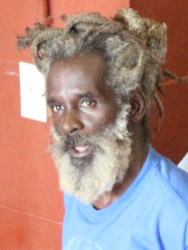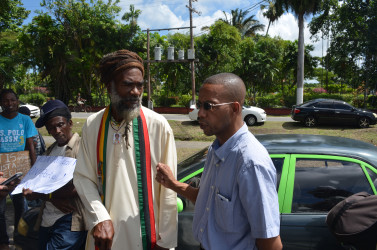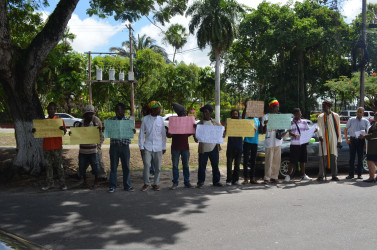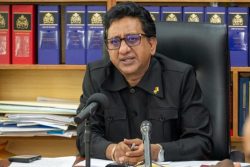Scores of members of the Rastafarian community yesterday staged a demonstration outside of the Attorney General’s office to protest against the “unjust laws” against the possession of marijuana, which they want decriminalised.

Spurred on by the recent sentencing of football coach Vibert Butts, who was jailed for three years after he pleaded guilty to having 46 grammes of cannabis in his possession, the protestors withstood the hot sun in hopes that their lobbying would see the country move with the rest of the world towards decriminalisation.
Butts, who was renowned for scoring Guyana’s first World Cup qualifier goal against Suriname in 1976, had repeatedly told the court that he did not traffic drugs but that it was simply his way of life and part of his cultural practices.
However, under Guyana’s Narcotic Drugs and Psychotropic Substances (Control) Act, possession of over 15 grammes of cannabis would attract a charge of possession of narcotics for trafficking and any person summarily convicted of the offence is liable to a sentence of at least three years but no more than five and a fine of at least $30,000 or the equivalent of three times the street value of the drug.
Efforts are underway to appeal Butt’s sentence and get him released on bail.
“I and I saying that it is I and I rights being violated because the constitution of Guyana claims religious rights to all groups and I and I have been serving the high majesty through the sacramental use of this holy herb,” Ras Simeon, President of the Rastafari Council of Guyana, told Stabroek News yesterday.

Simeon noted that during the elections campaign period, a lot of promises were thrown around but after the new government entered office no change has been sighted on the horizon.

In February this year, APNU General Secretary Joseph Harmon had said that an APNU government would review the decriminalisation of marijuana.
“We as the APNU, what we are committing to is a review of the laws as it relates to the use and sentencing policies as in relation to marijuana,” Harmon, who is now State Minister, had said.
Harmon had noted that the coalition realised that many of the country’s young men are languishing in the prison system because they were caught with small amounts of the drug and a study needed to be undertaken to ascertain if this has been beneficial to the country’s development.
For its part, the PPP/C, in its elections manifesto, had committed to review the legalisation of the use of marijuana and on the quantities that attract mandatory minimum jail sentences.
Simeon noted that around the world the image of marijuana is changing from that of a harmful narcotic substance to a medicinal and sacramental substance.
Guyana, he noted, remains stuck. “We also need to revisit the narcotics laws,” he added.
Simeon said the goal of the Rastafarian community is to ease the grip of the law on marijuana possession and consumption. He emphasised that while many Rastafarians and non-Rastafarians have been jailed because of the possession and use of marijuana, there is no link between the substance and violence.
‘Lil Murder’
“I am very devastated by the sentencing and I know the guy [Butts] and I know he got his children and he is very serious about their education. So who will look after their education now?” one of the protestors, who did not want to be named, questioned. He stated that there are many other cases where families were torn apart because of the jailing of members for possession of marijuana. “The police does come with broom and dustpan and if they find one seed they lock up everybody and they grandmother and maybe now the breadwinner is now in jail and everything is ruined,” he said.
He charged that the current penalty is too harsh and should be looked at. He explained that he was once incarcerated for four years for the possession of 46 grammes of marijuana and during that time he saw people who had committed more serious crimes come and go before him. “In jail they call marijuana ‘Lil Murder’ because you can’t get bail. A big man, with gray beard that never do anything in his life, that smoking marijuana all his life and never thief or anything, a man that’s a hero to Guyanese and an idol to younger children, they put in jail,” he said, while arguing that others are drinking alcohol and causing accidents but are still allowed to be granted bail or lenient sentences. The penalty for a first conviction for driving under the influence is $7,500, with successive convictions attracting higher fines.
Another protestor highlighted the case where two University of Guyana students were ordered to do community service after they were found guilty of armed robbery. “It’s unfair to us as people,” he added.
In addition to marijuana’s medicinal and religious uses, he emphasised the possibility of developing big industries from its different products. “The problem with it in this society is with smoking but this is not about smoking alone. We can create big industries in Guyana to reduce the crime rate. We can create jobs for the youths and boost the economy and we can supply to other countries,” he said.
Given the current economic situation in the country, he said he was convinced that the country is capable of setting up such an industry and that it should tackle the problem head on. “Our society is always a perverse society. We are always waiting on others to do things and we always respond after. We are still run by the colonial system and the outside world has to do something and say okay and then we do it,” he said, while emphasising that the country should use its own experience and knowledge to address the situation. He advocated for a forum where the members of the Rastafarian community can sit together with the authorities to discuss the issue.
Another protestor pointed to the impact on the economy from incarcerating persons for possession of marijuana.
“It’s unfair to people using small amounts of marijuana and to the taxpayers. It ain’t make sense to jail a man for one spliff. Calculate the amount of taxpayers’ money that has to be used to keep him in jail,” he argued, while saying that a non-violent crime should not be treated with such harshness. “This is the modern age and this is the thing that all nations are moving towards now and we need to loosen up the marijuana law,” he added.
Activist Mark Benschop was also on the picket line to show solidarity with the Rastafarian community. Another picket is expected to be held today in front of the High Court as the group is seeking bail for Butts and to raise more awareness about its campaign to change the laws.







